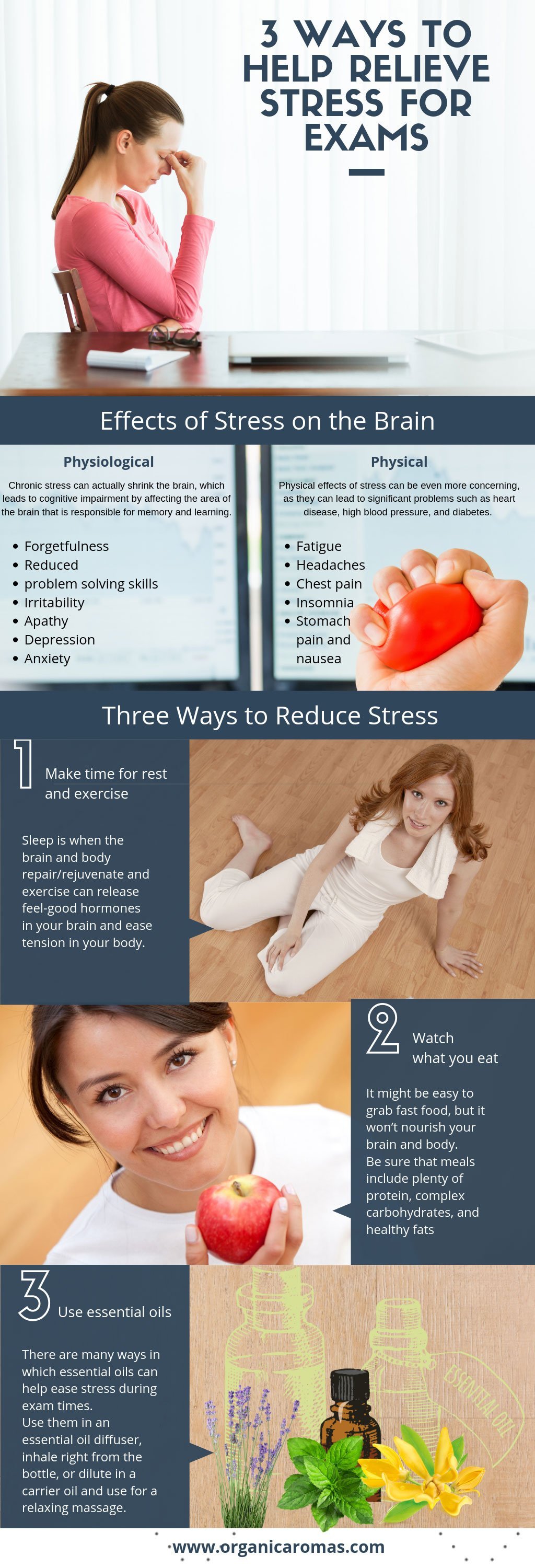3 Ways to Help Relieve Stress for Exams
When exam time comes around, students everywhere scramble to study. The late nights, the take-out food, and the long hours can take a toll on the body. Not only is there the stress of doing well on exams, but there are also the added effects that lack of sleep and intense studying can take on the body.
Physiological Effects of Stress on the Brain
Stress can affect anyone who is going through something difficult in life. Though small bits of stress can keep the senses in check, chronic stress can lead to long-term issues. Stress triggers physiological reactions that can be problematic over time as they can harm both the body and the brain. Studies show that chronic stress can actually shrink the brain, which leads to cognitive impairment by affecting the area of the brain that is responsible for memory and learning.
Other physiological effects of stress can include:
- Forgetfulness
- Reduced problem solving skills
- Irritability
- Apathy
- Depression
- Anxiety
Physical Effects of Stress On The Body
Physical effects of stress can be even more concerning, as they can lead to significant problems such as heart disease, high blood pressure, and diabetes. Chronic stress can cause the digestive, reproductive, and excretory systems to stop working properly. Common physical effects of stress can manifest as:
- Fatigue
- Headaches
- Chest pain
- Insomnia
- Stomach pain and nausea

Three Ways to Reduce Stress
Too much stress at any time can be bad for your health, but at exam time, the stress can intensify causing a loss of focus and an inability to retain information, which can lead to even more stress. It’s a cycle that must be broken. In order to give yourself every opportunity to do well during exam season, here are three ways you can relieve stress when it matters the most.
1) Make time for rest and exercise – It is important to get enough sleep when your body is going through a stressful time. Sleep is when the brain and body repair/rejuvenate, so get those 40 winks whenever you can. Even short naps can be beneficial.
It’s just as important to get some exercise when you’re dealing with stress. Take time out to play tennis, take a hike, or do some yoga. Exercise can release feel-good hormones in your brain and ease tension in your body.
2) Watch what you eat – It might be easy to grab fast food, but the items you find at the drive-thru won’t nourish your brain and body. Be sure that meals include plenty of protein, complex carbohydrates, and healthy fats.
Stay away from processed foods that can weigh you down. They often contain high levels of sodium that can make you feel bloated and elevate your blood pressure. By eating small meals regularly you won’t experience a dip in blood sugar levels. Also try to steer clear of caffeine, which is a stimulant that can make you jittery.
3) Use essential oils – There are many ways in which essential oils can help ease stress during exam times, as well as at other times in your life. Use them in an essential oil diffuser, inhale right from the bottle, or dilute in a carrier oil and use for a relaxing massage.
Lavender essential oil is highly beneficial for helping relieve insomnia. It contains calming properties that can lead to a better night of rest.
Neroli essential oil can be used to help soothe the symptoms of anxiety during test time. In one study, Neroli oil was found to have anxiety-relieving properties that have a calming effect on the brain and body.
Ylang-ylang essential oil can reduce stress and anxiety, but it can also improve your mood. One study showed that using ylang-ylang oil improved the self-esteem of the participants, which can be very helpful to college students at a time when confidence is important.
Peppermint essential oil can be used to relieve nausea and ease headaches, but it can also help improve performance or energize your mood. Studies have shown that peppermint oil can improve physical performance in athletes, as well as visual and audio reaction times. Peppermint oil can also increase memory, improve problem-solving abilities, and increase retention.
Essential oils can also be used to boost energy levels and uplift mood. Some of the best essential oils to use during study time include:
• Orange
• Grapefruit
• Bergamot
• Lime
• Basil
• Eucalyptus
These stress relieving tips can be used by anyone who is battling a stressful situation. Whether its crunch-time at the office or chaos at home, these techniques can help you ease the tension and anxiety that comes along with everyday life.
Pin It!


